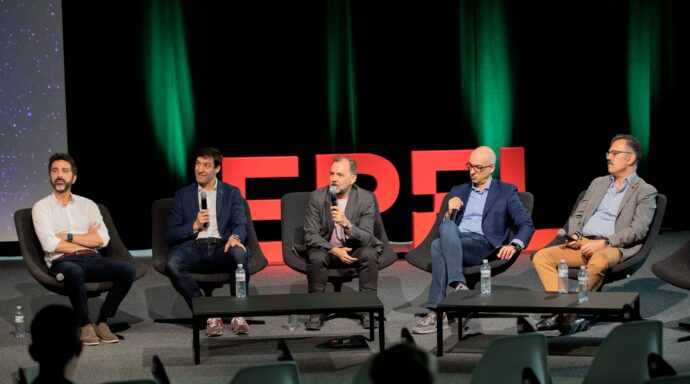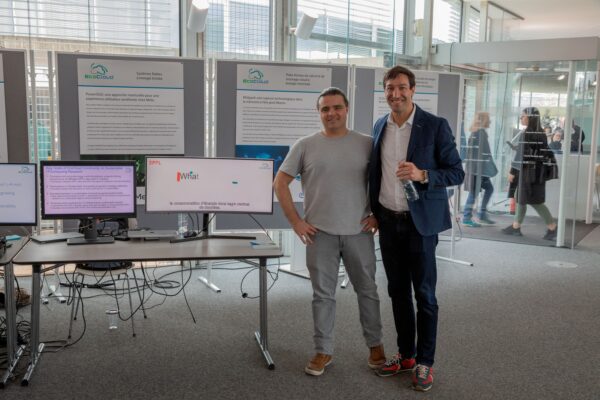Is sustainable computing compatible with business as usual? Not according to David Atienza Alonso, who says we need a culture change in how we build and use computing systems.
In this interview with HiPEAC (High Performance Embedded Architecture and Compilation) Info magazine, he explains why sustainable computing represents much more than just energy efficiency, and argues that a much more targeted use of computing is the way forward.
David, haven’t we always needed lots of energy to power data centres? What’s changed now?
In the past, as described by Moore’s Law, the number of elements in a data centre would double while the energy consumed on the computing side was roughly the same. In recent years, it’s been harder to get the same efficiency. We are seeing the effects of humans’ energy use on the planet, and it’s getting harder and harder to get energy at the levels we need.
That’s why we need more sustainable data centres and, in general, to develop a completely different way of building them. It’s not just about locating massive data centres needing 50MW of energy in the middle of nowhere: you still need to provide this energy, and that will affect the whole planet. Today it is estimated that data centres use 2-3% of the energy generated in the world. If current trends continue, this could reach around 7-8% by 2030.
What’s driving this growth? New applications or heavier use of established applications?
Both. Many of us are using applications that were used by a minority in the past – social media, for example, or online streaming – and the COVID-19 pandemic created major growthin these areas. There are also new applications in areas like artificial intelligence (AI) that are growing dramatically in the use of resources, such as large language models.
How does EcoCloud go about building smarter data centres?
EcoCloud brings together academic and industrial partners to work on solutions. Among our 14 industrial partners are major information-technology (IT) infrastructure providers, like HPE, Microsoft and Huawei, along with users of data centres, such as Swisscom and AXA. The technologies we develop, both hardware and software, are open source.

There are also 28 labs affiliated with EcoCloud, with a total of around 250 researchers, from the engineering, computer science, basic science and environmental engineering schools at EPFL. The main idea is to create multidisciplinary, public-private projects to deliver IT as a service to society.
One project, UrbanTwin, is creating a digital twin of the Swiss towns Aigle and Lausanne in partnership with ETH Zürich and others. EcoCloud acts both as coordinator and as cloud-computing infrastructure provider. In another project, Heating Bits, led by Professor Mario Paolone at EPFL, we’re building a new 5MW data centre from scratch in such a way that we extract as much as possible from every bit that comes out. For example, we have technology to extract electricity from the water which has been warmed from cooling data centres. The remaining hot water is then used to heat university buildings at EPFL.
EcoCloud has an educational component, too. We organize hands-on courses for companies, prepare courses for under-graduate students at EPFL and hold regular seminars.
Speaking of education, are there any myths about sustainable computing you’d like to bust?
Very often what people consider ‘sustainable computing’ is actually just ‘energy-efficient computing’. In fact, the largest part of the sustainability cost for data centres is building the servers. Servers are typically replaced every three to five years, even though research has shown that it would take (at least) 10-12 years of service for the carbon footprint involved in building them to be balanced out. So this replacement scheme does not work for the true concept of sustainable computing.
In Heating Bits, the goal is to take servers that are being replaced and change to new liquid cooling (integrating a new technology developed at EPFL, linked closely to my ERC Consolidator project Compusapien). This allows servers to be cooled down while operating in an overclocking regime on a continuous basis when performance is needed. Doing this can make them run for another six to seven years and deliver even better performance for certain workloads.
What developments would you like to see in this field over the next few years?
I’d like to see an awareness of what sustainable computing really means. We need to develop a completely new culture, dramatically changing how we build computers and how we use them. This aligns with EcoCloud’s mission to create a new sustainable computing research domain.
At the moment, when we create computing systems, we tend to think in a very limited way, focusing on consuming as little energy as possible while maximizing performance. In reality, you need a much broader understanding of the full cycle to be able to really address sustainable computing. A large set of competences is necessary to properly understand how people use computers, and we need to educate users to recognize that calculations are not for free.
To do this, at EcoCloud, we realized we needed to expand the labs involved from ones focusing on computing to ones covering a whole range of disciplines. We’ve also increased the number of companies involved; by including datacentre providers, hyper scalers and companies who use computing, we can evaluate the compute requirements for different applications.
For example, a luxury goods provider like Rolex could delay the most accurate (and computationally intensive) simulations of new models until they have a clearer understanding of the final design. Or in the case of banking, scheduling calculations at a certain time of day could maximize the use of renewable energy resources. Similarly, with the new generation of digital twins, as in the Urban Twin project, it may not be necessary to analyse every detail; mobility models, for example, could be much coarser and still provide valuable insights, and you can then create detailed models for particular problems. This involves a change of mindset; it’s about being application or goal driven.
All of our large projects are driven by PhD students and postdocs, and we encourage them to exchange information and come up with new ideas. Moreover, we are developing a new sustainable computing experimental facility in the new EPFL data centre, managed by EcoCloud, that will be ready by the end of this year. Once it’s ready, we’ll be able to work on master’s and PhD theses where we can really analyse the sustainability of different computing methods. For example, we’ll be able to calculate the carbon footprint of a particular algorithm running on our servers at a particular time of day. This kind of analysis can help create awareness and develop new IT sustainability courses that can drive the culture change necessary for more sustainable ways of computing.

Originally published in HIPEACinfo69